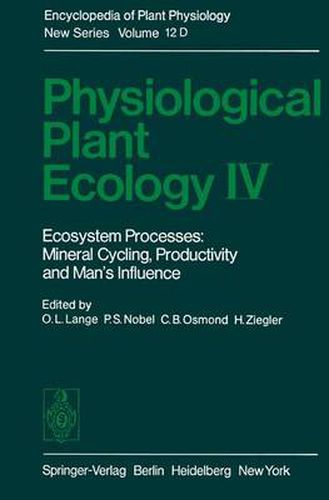Readings Newsletter
Become a Readings Member to make your shopping experience even easier.
Sign in or sign up for free!
You’re not far away from qualifying for FREE standard shipping within Australia
You’ve qualified for FREE standard shipping within Australia
The cart is loading…






This title is printed to order. This book may have been self-published. If so, we cannot guarantee the quality of the content. In the main most books will have gone through the editing process however some may not. We therefore suggest that you be aware of this before ordering this book. If in doubt check either the author or publisher’s details as we are unable to accept any returns unless they are faulty. Please contact us if you have any questions.
O. L. LANGE, P. S. NOBEL, C. B. OSMOND, and H. ZIEGLER In the last volume of the series ‘Physiological Plant Ecology’ we have asked contributors to address the bases of ecosystem processes in terms of key plant physiological properties. It has often been suggested that it is not profitable to attempt analysis of complex living systems in terms of the properties of component individuals or populations, i. e. , the whole is more than the sum of its parts. Nevertheless, assessments of ecological research over the last century show that other approaches are seldom more helpful. Although it is possible to describe complex systems of living organisms in holistic terms, the most useful descriptions are found in terms of the birth, growth and death of individ uals. This allows analysis of performance of the parts of the whole considering their synergistic and antagonistic interrelationships and is the basis for a synthe sis which elucidates the specific properties of a system. Thus it seems that the description of ecosystem processes is inevitably anchored in physiological under standing. If enquiry into complex living systems is to remain a scientific exercise, it must retain tangible links with physiology. Of course, as was emphasized in Vol. 12A, not all of our physiological understanding is required to explore ecosystem processes. For pragmatic purposes, the whole may be adequantely represented as a good deal less than the sum of its parts.
$9.00 standard shipping within Australia
FREE standard shipping within Australia for orders over $100.00
Express & International shipping calculated at checkout
This title is printed to order. This book may have been self-published. If so, we cannot guarantee the quality of the content. In the main most books will have gone through the editing process however some may not. We therefore suggest that you be aware of this before ordering this book. If in doubt check either the author or publisher’s details as we are unable to accept any returns unless they are faulty. Please contact us if you have any questions.
O. L. LANGE, P. S. NOBEL, C. B. OSMOND, and H. ZIEGLER In the last volume of the series ‘Physiological Plant Ecology’ we have asked contributors to address the bases of ecosystem processes in terms of key plant physiological properties. It has often been suggested that it is not profitable to attempt analysis of complex living systems in terms of the properties of component individuals or populations, i. e. , the whole is more than the sum of its parts. Nevertheless, assessments of ecological research over the last century show that other approaches are seldom more helpful. Although it is possible to describe complex systems of living organisms in holistic terms, the most useful descriptions are found in terms of the birth, growth and death of individ uals. This allows analysis of performance of the parts of the whole considering their synergistic and antagonistic interrelationships and is the basis for a synthe sis which elucidates the specific properties of a system. Thus it seems that the description of ecosystem processes is inevitably anchored in physiological under standing. If enquiry into complex living systems is to remain a scientific exercise, it must retain tangible links with physiology. Of course, as was emphasized in Vol. 12A, not all of our physiological understanding is required to explore ecosystem processes. For pragmatic purposes, the whole may be adequantely represented as a good deal less than the sum of its parts.